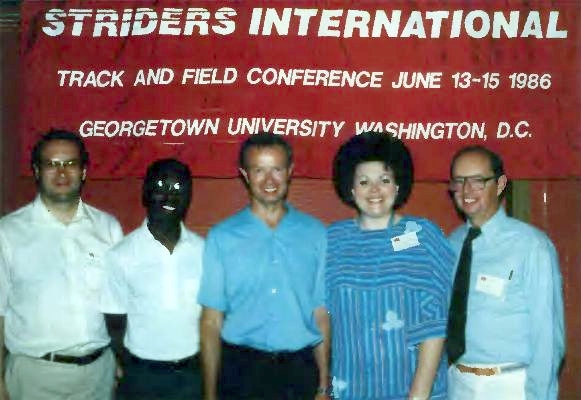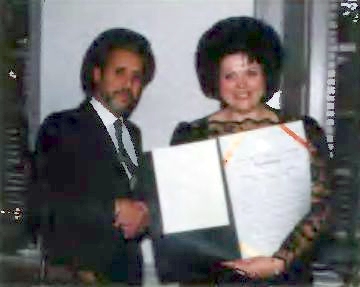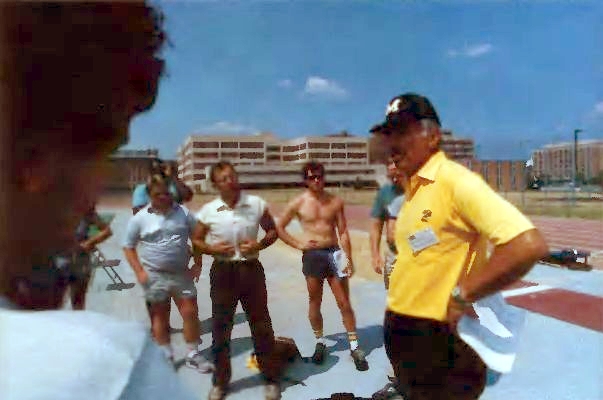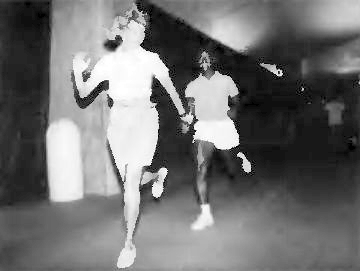![]()
The Words of the Holliday Family
|
|
The Words of the Holliday Family |

Ms.
Glenda Moody with Mr. Farley Jones (far left) and three
administrative assistants at the conference.
Striders International, Inc. was incorporated in 1983 by former collegiate track and field athlete Glenda Moody. It is an offshoot of the original DC Striders, which was one of the first social pro- grams the Unification Church helped to fund. The purpose of Striders International is to help minority youth get into college on scholarships using athletics as a motivating force. The program harnesses their positive energy, teaches discipline, and helps its young competitors reach for larger life goals. To date Glenda Moody has trained over 3,000 athletes, including 23 Olympic competitors and two gold medalists, one world-record holder, and many other world-class and national champions. They have received scholarships totaling over $28 million in value.
On the weekend of June 13-15, Striders International held its first annual Track and Field Clinic, hosted by Georgetown University in Washington DC. The essential purpose of the clinic was twofold: to consolidate the Striders' foundation on the national level, and to reach out to the international level. The highlight of the program was a VIP reception held on the evening of June 14 at a historic building on the Georgetown campus. Local politicians and dignitaries -- as well as diplomats and cultural attaches from 14 different nations -- were invited to hear testimonies about the Striders' ideals, accomplishments, and hopes for the future.
The clinic featured presentations by an all-star staff of Olympic coaches of the highest caliber, most of whom serve on the International Olympic Committee and coach routinely at the university level. These clinician-coaches shared the latest state-of-the-art sports techniques with other participating coaches from high schools and colleges all around the country. Guest speakers brought a depth of philosophical, spiritual, and ideological insight to the entire program. The awareness engendered by these talks had the overall effect of forging unity and morale for the 1988 Olympic Games.

Ms.
Glenda Moody receives from the Washington DC Council a resolution
expressing appreciation for her community service.
Kevin Brabazon, a trustee for the Striders, served as emcee throughout the three-day clinic. Early on the afternoon of June 13 the clinic began with some opening remarks offered by Jonathan Slevin, vice president of Striders International. He touched upon the responsibility of those present for the performance of American athletes in 1988, and the need to establish the Striders on the international level.
Then the clinic sessions got underway. Every morning and afternoon two sets of sessions were offered; four or five sessions were held simultaneously in almost every track-and-field event -- sprints, middle distance races, relays, hurdles, race walking, high jump, long jump, triple jump, pole vaulting, discus, and weight training. The coaches shared from their own experiences and demonstrated effective drills and training methods. In sessions held out on the track or in the gym, the participants were asked to try these techniques out for themselves. In sessions held in the classroom, lectures were accompanied by diagrams, films, and videotapes.
Each coach had come to know the body movements involved in his or her own event in precise detail. For example, one coach explained, "Everything that happens to the pole-vaulter in the air is the result of what happens on the ground:' and he examined this cause-effect relationship throughout each phase of the pole-vaulting maneuver. The coach for sprints outlined the "3 Ms" that characterize success in this event: Maximize acceleration, Maintain velocity, and Minimize deceleration. In one very technical session on biomechanics, the instructor outlined Newton's three laws of motion -- the law of inertia, the law of acceleration, and the law of reaction -- and explained how their application could streamline the athlete's movements and make them more effective.
In the course of the discussions the coaches expressed tremendous consideration of, and concern for, their athletes. They discussed ways of handling the psychological and social problems associated with competing under pressure, with winning -- and with losing. They emphasized that athletics is not an end in itself, but an education of character. They feel responsible to help young people keep their sports endeavors in perspective, because their goal is really to build the whole person. It was clear just how much these coaches really love and care for the youth they train.

Participants
listen attentively as one of the Olympic staff coaches explains the
techniques of the triple jump.
While the clinic sessions dealt with the pragmatic aspects of training in track and field, the talks delivered dealt with the issues of heart and mind surrounding sports, from the individual level to the international level. At dinner on the first evening, diplomats from Canada and South Korea, where the 1988 Winter and Summer Games are to be held, extended to the coaches warm invitations to come to their countries. One interested senator who visited the clinic spoke at some length about how America has become a "spectator nation" of people who are not as healthy as they should be. "We must translate athletics into our own live," he said. "From the admiration of others we must learn to make our own best efforts in sports."
On the morning of the second day two films produced by the South Korean government were shown. The first showed the preparations being made by the South Korean people for the Summer Games. They are hard at work creating the most beautiful and functional sports facilities, and they are truly excited about welcoming the whole world into their little country. The other film, made to promote South Korea's tourist industry, did in fact capture the breathtaking beauty of that mysterious land. After lunch, in a more serious vein, Tom Ward, executive vice president of CAUSA International, gave an impressive talk based on CAUSA principles.
In the evening over dinner one of the staff coaches delivered a very funny and entertaining pep talk. Be yourself, be the best that you can be, he said, and "put gratitude in your attitude He spoke about the need for faith in God, and the ability to laugh at ourselves. He told the coaches that they have the power to be the most influential people in their communities; they should help young people become winners and resist dropping out of life in the face of discouragement. He put his points across with so much humor and compassion that the audience was almost laughing and crying at the same time. Then on the final morning Farley Jones, president of Striders International, gave a pro- found talk that brought together all the major themes of the clinic.
The VIP reception for dignitaries and diplomats on Saturday evening was the moment when the international goals of the Striders really came into focus. Emcee Kevin Brabazon remarked, "There are many young people, especially in developing and Third World nations, who would greatly appreciate the opportunity to study at American universities. There are also many coaches in other nations who would be interested in and who feel that they could benefit by the methods of athletic training developed here. As a central democratic nation, America should have the inclination to share its secrets, its skills, its resources, and its opportunities with others:' He said it was Glenda Moody's vision to make the expertise of America's Olympic- caliber coaches, and the opportunities provided by the Striders Scholarship Acquisition Program, available to coaches and athletes around the world.
Three of the coaches then gave testimonies about how profoundly Glenda had changed their own viewpoints about coaching. She took young people who had been embittered victims of unfairness and discrimination and made them into "quality human beings:" As one coach put it, she went the "whole nine yards" with each one of her trainees. There were many humorous descriptions of Glenda's ebullient style of training and loving her athletes -- all of which evoked affectionate laughter.

Coaches
practice the special skills involved in passing the baton in relay
races.
The expressions of appreciation from these coaches, who had known Glenda a long time, caught her off guard. She was already in tears when Benita Fitzgerald-Brown, 1984 gold medalist in the 100-meter hurdle, got up to give her testimony. Standing before the microphone with wet eyes, Benita also fought for composure. "I don't think I would have been able to make it if it hadn't been for the Striders' she said.
After the close of the program, guests talked and lingered. Everyone felt drawn together in a very warm and comfortable spirit. Many of the guests made important new friends that evening, forging alliances through which they could begin to feel some of the hope that Glenda's ideas were generating.
The clinic ended the following day after lunch, when Glenda presented plaques expressing her appreciation to four assistants for the success of the clinic. The participants were virtually unanimous in feeling that the clinic had been helpful and inspiring in every way, and they were all anxious to do it again. In fact, Striders International is planning two more clinics in preparation for the Olympic Games, in hopes that God will be the real winner in 1988.